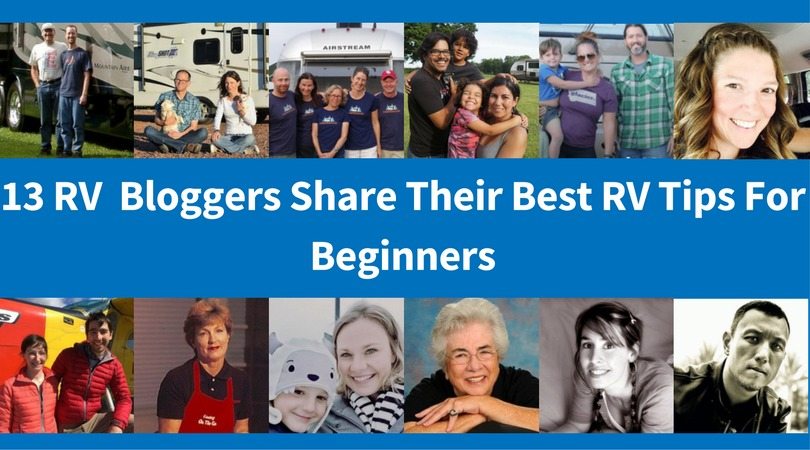Travelling is amazing. You get to meet new people, new culture, new places. A life on the road is an adventure full of challenges but not all of them are as great as we wish. Living in an RV gives you the possibility to move around wherever you want, take your spouse and kids with you and also your belongings.
If you plan to start living the RV lifestyle, there are many obstacles you may encounter. From buying the right type of RV, to what you have to pack, to how often you should move with your mobile home, be aware that RVing is great but also difficult.
Our goal is to help you, our readers, get the best RV suitable for your needs and personality so you can hit the road and enjoy traveling. To make things easier for you we decided to reach out to 13 experienced RV bloggers and ask them:
What are your top 3 RV tips for beginners?
We received some great tips that we would love to share with you.
Robert & Jessica Meinhofer – Exploring The Local Life
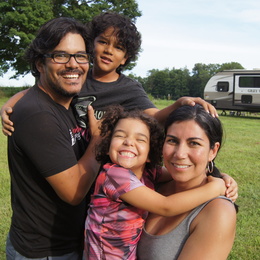
1. Don’t Overspend on you RV Purchase. Remember that the RV purchase is the first in a long line of RV related expenses. You still have to buy essential accessories – sewer hose, fresh water hose, heated hose, wheel chocks, levelers, etc. You will also have to stay somewhere with your RV ($20-$50/night) and maybe you will need to store it ($100/month). Even if you decide to do only free camping, you will probably need to modify your RV to be suitable for use without electric, sewer, or water hookups – that means solar, generator, composting toilet, extra water containers, etc.
2. Buy what you NEED.
This can be hard to gauge if it is your first RV, but don’t go for the biggest, fanciest RV.Click To TweetYou don’t want to spend $50K or more on something that you may not end up liking or needing. Keep things simple.
It is much easier to upgrade later if you find that you do need that extra slide or find out that the RV kitchen would actually come in handy.
3. Avoid Financing. Try to buy your RV with cash or put down as much as you can. RV dealerships will make it easy for you with low payments, but what is the bottom line? How much will you end up paying in the end? This is especially important since RVs depreciate so quickly (even faster than other vehicles). If you need to resell it, you may still owe on that easy payment loan.
Peter & John – The RV Geeks
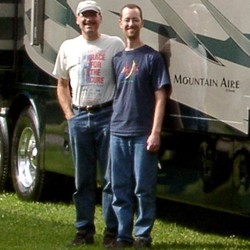
1. Buy the smallest RV you think you can be comfortable in.
While we love many things about our 43′ rig, we wish we’d gone smaller, and are looking to downsize. There are just too many places we can’t stay due to our size. If you plan to just drive from one RV resort to the next, smaller will probably be less important.
But if you value the great outdoors and dramatic natural beauty (National Parks!), ask yourself if you absolutely need all that space. Once you’ve narrowed your list of features and options to the absolute must-haves, it’s all about floorplan. A little time spent searching for just the right one might uncover a rig with most or all of the features on your wish list, but in a more compact size, several feet shorter than you might have thought possible.
Also, consider making your first RV a used one. That way you can learn which features are really important to you, and make your second rig the “perfect” one, without taking the depreciation bath that selling a rig bought new will usually bring.
2) Realistic expectations will help you enjoy RVing more.
RVs are a conglomeration of many complex systems; half vehicle, half house. If you’ve ever bought a new home, you know there’s always a punch-list for the builder. Regardless of whether you buy new or used (although very old rigs will certainly require more care), there are usually at least a few things that need tending.
Becoming a handy DIY RVer will help save money on maintenance and repairs.Click To TweetBut whether you do it yourself or not, going in with an understanding that any worthwhile endeavor requires some effort will help you enjoy it more.
3) Take advantage of the many available resources.
The happiest RVers we meet are those who’ve learned to manage their systems well. The prospect of your first time behind the wheel or your first time getting level and set up on a campsite (or your first black tank dumping!) might be intimidating. Going in with some advance knowledge can turn those firsts into successful non-events. The plethora of blogs and videos sharing every aspect of RV life are a fantastic resource we wish we’d had. Watch and read before you get started, and you’ll make a lot fewer newbie mistakes than we did!
Craig and Bryanna – Crazy Family Adventure
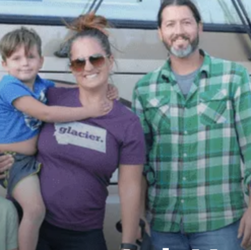
We have been on the road since May 2014 with our 4 kids and dogs. We currently travel in a 23 foot Winnebago View.
Our top 3 RV tips for beginners are:
1 – When planning out your driving time do not trust the time that Google Maps gives you. In an RV you are driving slower so you should plan on adding on at least an hour or 2 to your ETA. This is important to know if you are trying not to drive at night or if you are trying to reach a campground by a certain time to check into your site
2- If traveling with kids be sure to let the campground you are looking at know that you have kids.Click To TweetThere are more and more campgrounds and RV parks that are charging a kid tax. Meaning the rate they give online is only for 2 people and if you have kids they may charge you up to $5 extra per night per kid. Also, note these campgrounds usually aren’t the most kid or family friendly so it is usually a good indicator to look for somewhere else to stay!
3 – When packing your RV less is more. The fewer things you bring with the less you have to worry about and the more you can enjoy being in your RV. There are so many cool knick knacks and accessories you can get for RVing but in reality, all you really need are the basics to have an enjoyable, simple and less stressful trip!
Robin and Laura – BackpackerGuide.NZ
New Zealand is the RVer’s dream. Over the course of our feature doing 365 days: 365 activities in New Zealand, traveling all over New Zealand in an RV, we learned a few things about RVing that we wish we’d known at the start of our adventure. Here goes:
1. When buying an RV, make sure every single appliance works! RVs are awesome but when we were RVing newbies, we underestimated the amount of appliances and functions an RV had. There were a few appliances we missed when viewing the RV before we bought it, such as the gray waste pipe and even the hot water. Take the time to check everything – even if it takes you all day.
2. Storage boxes are your best friend. We kept almost every possession we owned in labeled plastic containers and storage boxes, which made finding things so much easier. That’s essential in a small living space
Plan for your overnight stop. If you are freedom camping, you will want water in your tanks, gas in the gas bottles, etc.Click To TweetBut if you are going to stay in a well-equipped holiday park, don’t bother driving around with a full water tank with all that extra weight.
Kelly Beasley – Camp Addict

I live full-time in my RV and life and breathe the RVing lifestyle. My 3 top RV tips for beginners are:
1. You don’t need all that stuff. I have gotten rid of about 85% of what I originally packed. What do I miss? NOTHING.
2. Slow down. You can’t see it all at once. Stay in the area a while, meet some of the locals
3. Get off the grid!
With a generator or solar power, you can easily camp for free. Check out BLM land and national forests.Click To TweetHeather Ledeboer – Faith Takes Flight

1. Don’t underestimate the potential costs of truck/RV repairs. Click To TweetIf you are purchasing a new truck or RV and plan to use them often, I suggest paying extra to get the additional insurance coverage. We live full-time in our RV and during our first year of travel, we paid several thousand dollars for the RV and truck related repairs. I am so glad we had set aside extra funds so that these unexpected expenses didn’t end our trip prematurely.
2. Go as slow as you can. it’s so tempting to travel fast trying to see it “all”.
. We have found that as the speed of our travel increases, our enjoyment level decreases. Moving often from one location to another can be stressful.
Our ideal minimum is one week but we have talked to others who have a very different minimum. Figure out what yours is and try to honor it whenever possible.
3. Document your journey. As memorable as your travels are, you will forget the details over time. Take photos or videos and jot down favorite RV Parks (perhaps even the site number(s), restaurants, and side trips. Find a method that works well for you and be consistent. Over time it will make it easier to recall where you have gone and allow you to share those details with other travelers you will meet on the road.
Brian Easterling – Campendium
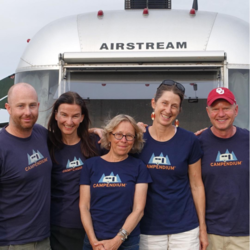
1. Don't try to see the entire country in a week! So often new RVers want to see it all and create extensive itineraries.Click To TweetThis leads to too many hours driving and not enough time spent relaxing and exploring.
2. Overpacking. When we first started RVing, we researched RV packing lists online and ended up over packing. We’ve been on the road for almost 8 years now and don’t carry half of what we did when we first started.
3. Make a reservation. Popular campgrounds book really fast and don’t think that you can show up without a reservation. If you’ve waited until the last minute there are tons of free first come first serve sites in the west.
Margo Armstrong – RV Lifestyle Experts
I am an RV Lifestyle Expert with 22 years of experience living in an RV; currently residing full-time in my third RV.
As the author of nine books on the RV lifestyle, I am often asked that question, “What Are My Top Tips for Beginners.” My website, RV Lifestyle Experts.com, has several pages of information devoted to this topic.
Here are my top three RV tips for beginners:
1. Take the time to research and find the perfect RV.Click To TweetTo help with choosing the type of RV for you, decide if you want to travel around this beautiful country (motorhome) or just to one destination for a season (fifth wheel).
2. Regardless of the age or manufacturer, always, always, always have the RV inspected by an independent RV inspector or local RV repair shop/mobile repair person.
3. Watch the loading weight of your RV, travel light.
Bonus tip:
Buy older, not newer. (Important right now with manufacturer recalls at an all-time high)
Steve Johnson – Road Pickle

1. Download and install the Open Signal app for your phone or tablet. This gives the most up to date, and the most accurate coverage map for 4G LTE carriers, including Verizon, AT&T, and T-Mobile. Today’s RV newbies want their Internet access and phone signal, and most RV parks and campgrounds have horrible Wi-Fi. http://www.opensignal.com
2. Get a 12V tire inflator, and make sure it’s rated for 80 PSI or higher. If you don’t, you’ll be hard pressed to get your RV maneuvered next to a coin-operated air pump. Because RV tires carry such high loads, they’ll burn up and explode on the highway if air pressure gets low. All home improvement stores sell them for $60.00 or less.
3. Many RV Parks are now denying access to RV’s older than 10 years of age. They are trying to avoid a growing problem of unsightly rigs creating eyesores in their parks.
If you have not yet purchased your RV, look for something no more than five years oldClick To TweetThis way, you can keep it for a few years and still find a buyer before it reaches 10.
Elizabeth Newcamp – Dutch Dutch Goose

I’m a family travel blogger currently living as an expat in Europe. We don’t live in an RV but recently spent some time traveling around France in an RV.
Our RV tips for beginners are:
1) Pack what you need. The RV has a ton of space. Make it count and be comfortable.Click To TweetWe didn’t pack enough cleaning supplies and skimped on a few things that we ended up picking up along the way. It’s more fun when you have what you need. So bring the big pack of paper towels, toys and whatever makes you comfortable.
2) Time your water and dumping to grocery store visits. We were staying in farms (through an amazing program called French Passion, they have a US branch called Harvest Hosts) so we picked up water and dumped at grocery stores that offered the service. This meant that one of us could shop while the other dumped. It was a huge time saving and super convenient.
3) Ask for help. The RV community is as friendly as they come. We knew enough to know what we didn’t know. We had to ask for help getting up on our leveling blocks the first time, a lovely German couple taught how to coach my husband up on them. We asked a U.K. Couple where to dump (and found out about the grocery store trick) and even had another Driver help us navigate a tricky turn. Above all, we want to say how much we loved our time in the RV. We were super nervous and it ended up being one of our best trips ever, and we travel a lot.
Marko Mihajlovic – Tour Makers
RV’s are high up the list of things that are great fun but potentially a greater responsibility. Click To TweetThese are the three most common mistakes I’ve heard people make with their RV’s.
1) Not running a checklist
RV’s are homes and cars and they are also a combination of complexities of the two which does require a checklist in order to keep track.
Each time you stop at a camp site you need to make sure that you have a place reserved, that you have connected all the utilities, took proper care of them, and even more important, disconnected properly
2) Taking care of the fridge.
RV fridges are more demanding than the in-house ones. They build up ice quickly, they are not on all the time so food leftovers can turn to mold, and a leak-caused short-circulation can easily become a leak-caused fire.
3) Not learning how to drive an RV.
RV’s are a different kind of animal. They are bulky, wide, tall. More agile than a truck, bulls in a china shop compared to vans. Take time and learn how it accelerates, brakes, turns, how to back it up and how high is not high enough.
Janet Groene – Camp And RV Cook

As a full-timer and part-timer, I’ve always loved cooking in the RV and that smug feeling of self-sufficiency, serving healthful meals while other travelers eat road food. My top three quick tips for newbies, galley-wise, are:
1. Furnish the RV galley with the right stuff, not kitchen cast-offs. Consider size, weight, stow-ability, cleanability. Without a dishwasher, you’ll want the best nonstick pots and a different mug for each person so it can just be swished out between uses. Beware the new programmable electric appliances. They need uninterrupted power, which isn’t always available in RV travel.
2 Have a backup cooking source, even if it’s just a Sterno stove. My galley stove is propane. My favorite second stove is an inexpensive electric hot plate that can be used indoors or out on the picnic table, under a skillet, pressure cooker, coffee maker, corn popper, ad inf. The campfire is the ultimate camp cooker, but campground fire bans come and go and last for.weeks.
No matter how brief the trip, have enough extra food for at least one day for each three days you'll be goneClick To TweetRoads close. Plans change. Food is insurance.
Cat Holladay – The Compass is Calling
We are a family of three, living full time in our Class A motorhome. We traveled for many years in the traditional way, but finally decided we wanted to get on the road full time.
We’ve learned many things the hard way, and still, have a lot to learn!
Living in an RV is certainly not for everyone, but for those willing to take the plunge, it can be extremely rewarding.Click To TweetWho else can say their backyard view changes whenever they feel the urge?!
If you are just getting started, there are a few major things you should prepare for. First, make sure you KNOW your travel partner(s), and by this we mean know them well! Communication is key. Living in an RV is unlike living in even a tiny apartment. Interior space is limited, walls are thin, and things don’t always work like they do in a conventional building. If you aren’t able to communicate well, it can lead to frustration, resentment, and disappointment with this amazing lifestyle. Don’t let that happen – talk to each other and understand that you are all learning together.
If possible, ease into it. We started by staying put for a few months. Not having the stress or pressure of moving around allowed us time to get to know our coach, fully outfit it with the things we truly needed, and get to know how living in a tiny space felt. It was a perfect introduction to the RV lifestyle.
Finally, understand that an RV is a home on wheels. Can you imagine moving a conventional home around weekly, monthly, etc.? NO! Because you are moving an entire house with lots of parts and pieces pretty regularly, THINGS HAPPEN. What worked fine yesterday suddenly doesn’t work despite no seeming cause. That slide that was pulled in and out 6 times in the last week all of a sudden won’t come back in. Know that SOMETHING will break, change, or make a funny noise every time you turn the engine over. Roll with it. Learn to laugh. And have a good warranty!
Thank you so much to all the bloggers that contributed to this expert roundup! We appreciate you sharing your experience with us and our readers.
Share with us your top tips for new RVer’s in the comments below!


